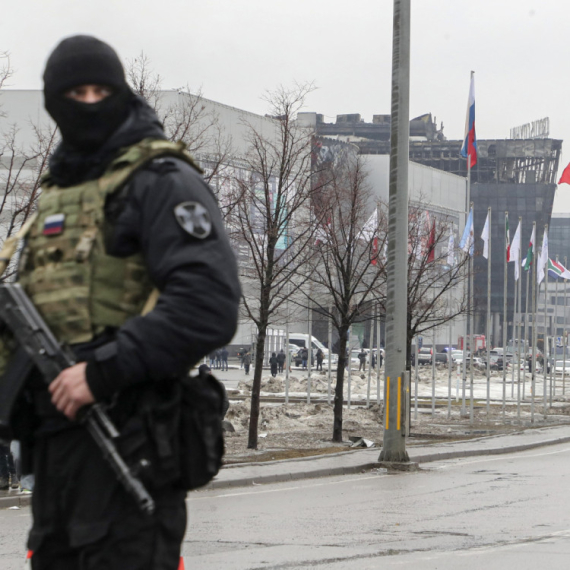"EU to decide how to tackle north after vote"
Pieter Feith says Brussels will decide on taking over jurisdiction in northern Kosovo after May 11.
Tuesday, 08.04.2008.
09:07

Pieter Feith says Brussels will decide on taking over jurisdiction in northern Kosovo after May 11. The EU's representative to the province was speaking in an interview to Reuters on Monday, when he says that the aim of the EU mission, dubbed EULEX, is to be operational by June 15. "EU to decide how to tackle north after vote" "Kosovo's new EU supervisors are watching closely whether pro-Europeans defeat nationalists in Serbia's May election, before deciding how to tackle the Belgrade-backed Serbs in Kosovo's renegade north," Reuters said. The reports adds that Serbs in the north "are promising to resist", and says they have the backing of Prime Minister Vojislav Kostunica, described as "nationalist". Asked how his office and the 2,000-strong EU police and justice mission planned to take over from the United Nations in the north, Feith told Reuters: "It would be important to see who is coming out of the elections of May 11 as the determining factor for the next government, and we'll take it from there." "Given the current situation we are in ... we will have to continue to reflect on this and work with Belgrade and the (Kosovo) government on how this is going to be taken forward," he said. But the Dutch diplomat, a "former NATO mediator in ethnic Albanian insurgencies in neighboring Macedonia and southern Serbia", underlined that Kosovo's Western backers would "not allow Belgrade to compromise the sovereignty of the new state". "I would not like to see Belgrade wielding a permanent veto over what happens to Kosovo," said Feith. "This is an independent, sovereign state, recognized by more than 30 of the most important democracies and economies in the world. We do not see it as a helpful proposition that the sovereignty of Kosovo would be impaired in a way as we see now." Feith has accused Belgrade of trying to partition Kosovo along ethnic lines, Reuters added. "To Kosovo Serbs, Feith's Civilian Office and the EU police force are 'occupiers'. A preparatory team from his office has already withdrawn from north Mitrovica, under threat of attack," it continued. Feith said he "wouldn't exclude" the possibility of UN authorities "playing an extended role in the north", but said he "did not want to speculate". Reuters described the May vote as "promising to be the most important since the country toppled late strongman Slobodan Milosevic". "It will decide whether Serbia pursues a future in the European Union or turns its back on the bloc, which supports Kosovo's 2 million Albanians," the news agency explains, and adds that "the EU hopes that a government led by President Boris Tadic's Democrats, though also opposed to Kosovo's independence, will be more accommodating towards Feith's EU mission". "We are aiming at establishing a modern, multiethnic justice system, a multiethnic police, a single legal space for the whole of Kosovo," said Feith. "For that you need Serb cooperation." Monday in Pristina, Kosovo Albanian leadership signed the "Kosovo constitution", previously approved by Feith. Now the diplomat, who described the document as "consolidating Kosovo as a modern, multi-ethnic state", called on Serbs "to chose a government in Belgrade that would give priority to its EU perspective rather than "look to the past and focus on the injustices". "The EU is clear that it does not wish Kosovo to end up as a failed state, or as a frozen conflict," Feith concluded. Pieter Feith (Beta) "Serbs should accept Ahtisaari Plan" Pieter Feith says that the Kosovo Serbs should accept the Ahtisaari Plan, since it guarantees them a better future. “We have to convince them to trust the plan’s provisions. The Serbs can have a better future, better economic opportunities, and their way of life will be entirely respected,“ said the international civic representative to Kosovo in an interview with Radio Free Europe. Feith said that the Ahtisaari Plan contained matters of the utmost importance to the Kosovo Serbs. The plan envisages the formation of a multi-ethnic, democratic state, with firm guarantees for the Serbs through decentralization and the formation of municipalities with Serb majorities. Neither Belgrade nor the Kosovo Serbs recognize the Ahtisaari Plan or the EU mission’s deployment in Kosovo, as they have not been approved by the UN. Without going into any details, Feith said that the EU mission was functioning in northern Kosovo too, in majority Serb areas. Commenting on Kosovo Minister Slobodan Samardzic’s proposal for creating an atmosphere of functional separation between the province’s Serbs and Albanians, Feith said it was not a good way of solving problems. “The UNMIK chief [Joachim Ruecker] is duty-bound to take a position on that issue. As far as I’m concerned, this proposal cannot be a good way forward, and cannot benefit anyone,“ said the EU representative. The International Civil Office’s activities are stipulated by the Ahtisaari Plan. Its formation was approved on February 28 by the International Steering Group for Kosovo. The Office’s purpose is to handle implementation of the international mediator’s plan. Feith said that the mission’s organization was under way. On June 15, when the Kosovo constitution is due to enter into force, the transitional period is scheduled to end, and the International Civil Office’s mandate to begin, involving the supervision of the Kosovo authorities’ efforts to fulfill their obligations.
"EU to decide how to tackle north after vote"
"Kosovo's new EU supervisors are watching closely whether pro-Europeans defeat nationalists in Serbia's May election, before deciding how to tackle the Belgrade-backed Serbs in Kosovo's renegade north," Reuters said.The reports adds that Serbs in the north "are promising to resist", and says they have the backing of Prime Minister Vojislav Koštunica, described as "nationalist".
Asked how his office and the 2,000-strong EU police and justice mission planned to take over from the United Nations in the north, Feith told Reuters: "It would be important to see who is coming out of the elections of May 11 as the determining factor for the next government, and we'll take it from there."
"Given the current situation we are in ... we will have to continue to reflect on this and work with Belgrade and the (Kosovo) government on how this is going to be taken forward," he said.
But the Dutch diplomat, a "former NATO mediator in ethnic Albanian insurgencies in neighboring Macedonia and southern Serbia", underlined that Kosovo's Western backers would "not allow Belgrade to compromise the sovereignty of the new state".
"I would not like to see Belgrade wielding a permanent veto over what happens to Kosovo," said Feith.
"This is an independent, sovereign state, recognized by more than 30 of the most important democracies and economies in the world. We do not see it as a helpful proposition that the sovereignty of Kosovo would be impaired in a way as we see now."
Feith has accused Belgrade of trying to partition Kosovo along ethnic lines, Reuters added.
"To Kosovo Serbs, Feith's Civilian Office and the EU police force are 'occupiers'. A preparatory team from his office has already withdrawn from north Mitrovica, under threat of attack," it continued.
Feith said he "wouldn't exclude" the possibility of UN authorities "playing an extended role in the north", but said he "did not want to speculate".
Reuters described the May vote as "promising to be the most important since the country toppled late strongman Slobodan Milošević".
"It will decide whether Serbia pursues a future in the European Union or turns its back on the bloc, which supports Kosovo's 2 million Albanians," the news agency explains, and adds that "the EU hopes that a government led by President Boris Tadić's Democrats, though also opposed to Kosovo's independence, will be more accommodating towards Feith's EU mission".
"We are aiming at establishing a modern, multiethnic justice system, a multiethnic police, a single legal space for the whole of Kosovo," said Feith. "For that you need Serb cooperation."
Monday in Priština, Kosovo Albanian leadership signed the "Kosovo constitution", previously approved by Feith.
Now the diplomat, who described the document as "consolidating Kosovo as a modern, multi-ethnic state", called on Serbs "to chose a government in Belgrade that would give priority to its EU perspective rather than "look to the past and focus on the injustices".
"The EU is clear that it does not wish Kosovo to end up as a failed state, or as a frozen conflict," Feith concluded.
"Serbs should accept Ahtisaari Plan"
Pieter Feith says that the Kosovo Serbs should accept the Ahtisaari Plan, since it guarantees them a better future.“We have to convince them to trust the plan’s provisions. The Serbs can have a better future, better economic opportunities, and their way of life will be entirely respected,“ said the international civic representative to Kosovo in an interview with Radio Free Europe.
Feith said that the Ahtisaari Plan contained matters of the utmost importance to the Kosovo Serbs.
The plan envisages the formation of a multi-ethnic, democratic state, with firm guarantees for the Serbs through decentralization and the formation of municipalities with Serb majorities.
Neither Belgrade nor the Kosovo Serbs recognize the Ahtisaari Plan or the EU mission’s deployment in Kosovo, as they have not been approved by the UN.
Without going into any details, Feith said that the EU mission was functioning in northern Kosovo too, in majority Serb areas.
Commenting on Kosovo Minister Slobodan Samardžić’s proposal for creating an atmosphere of functional separation between the province’s Serbs and Albanians, Feith said it was not a good way of solving problems.
“The UNMIK chief [Joachim Ruecker] is duty-bound to take a position on that issue. As far as I’m concerned, this proposal cannot be a good way forward, and cannot benefit anyone,“ said the EU representative.
The International Civil Office’s activities are stipulated by the Ahtisaari Plan.
Its formation was approved on February 28 by the International Steering Group for Kosovo.
The Office’s purpose is to handle implementation of the international mediator’s plan.
Feith said that the mission’s organization was under way.
On June 15, when the Kosovo constitution is due to enter into force, the transitional period is scheduled to end, and the International Civil Office’s mandate to begin, involving the supervision of the Kosovo authorities’ efforts to fulfill their obligations.


























































Komentari 25
Pogledaj komentare